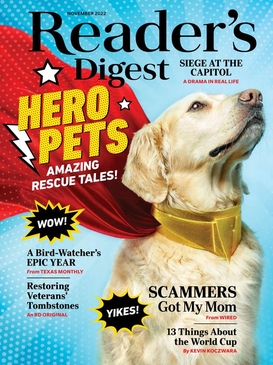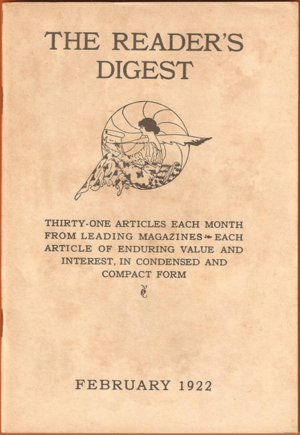Reader's Digest facts for kids

Cover of the November 2022 issue
|
|
| Chief Content Officer | Jason Buhrmester |
|---|---|
| Format | Digest |
| Total circulation (2020) |
3,029,039 |
| Founder | |
| First issue | February 5, 1922 |
| Company | Trusted Media Brands, Inc. |
| Country | United States |
| Based in | Manhattan, New York City, New York, U.S. |
| ISSN | 0034-0375 |
Reader's Digest is a popular American magazine for families. It comes out ten times a year and is known for its small, compact size, which is about half the size of most other magazines. It was started in 1922 by DeWitt Wallace and his wife Lila Bell Wallace. For many years, Reader's Digest was the best-selling magazine in the United States.
This magazine is also published in many other countries around the world. It reaches millions of people through its different editions in various languages. You can find Reader's Digest in print, Braille, digital, and audio versions. There's even a large-print edition for easier reading.
Contents
The Story of Reader's Digest
How the Magazine Started
In 1920, DeWitt Wallace and Lila Bell Wallace got married. Soon after, they started Reader's Digest in a small basement office. Their idea was to collect interesting articles from many different magazines, make them shorter, and put them all into one new magazine. This way, readers could enjoy a variety of topics in one place.
The Wallaces hoped their new magazine would earn them some money, but it grew much faster than they expected! By 1929, just seven years after it started, the magazine had 290,000 people subscribing to it.
Growing Around the World
The first international edition of Reader's Digest was published in the United Kingdom in 1938. Over time, the magazine became very popular globally. At one point, it had 40 international editions in 13 languages. It was even the most widely read magazine in countries like China, Mexico, and Spain. Today, Reader's Digest is published in 49 different editions and 21 languages, reaching over 70 countries.
What You Find Inside
For many years, each issue of Reader's Digest had about 30 articles. It also included fun features like:
- "It Pays to Increase your Word Power" – a vocabulary quiz.
- "Amusing Anecdotes" and "Personal Glimpses" – pages of funny stories.
- "Humor in Uniform" and "Life in these United States" – more funny stories.
- Longer articles that were often shortened versions of published books.
Other popular sections included "Drama in Real Life," which featured survival stories. Over time, the magazine's look changed to include more colorful pictures and graphics.
In 1945, the first "Word Power" column appeared. In 1952, the magazine published important articles that connected smoking with lung cancer. From 2002 to 2006, Reader's Digest even held a vocabulary competition for schools across the U.S. called the "National Word Power Challenge."
How the Magazine is Owned
In 1990, the company that owns Reader's Digest, called The Reader's Digest Association, Inc. (RDA), became a public company. This means people could buy shares of the company. Over the years, the company faced some financial challenges. In 2009 and again in 2013, the company had to go through a process called Chapter 11 bankruptcy to reorganize its finances and keep operating.
In 2010, the UK part of Reader's Digest was sold to its own management team. This team continued to publish the UK edition under a special agreement. However, the UK edition stopped publishing in April 2024 after 86 years.
Special Offers and Contests
Reader's Digest has often offered products through the mail, sometimes with contests called "sweepstakes." In 2001, agreements were made to ensure that these contests were fair and clear to everyone. The rules made sure that people understood they didn't have to buy anything to enter or win a sweepstakes.
The UK edition of Reader's Digest also faced some concerns about its mailings. In 2008, an investigation found that some mailings were misleading, especially for older people. As a result, Reader's Digest was told not to use those types of mailings again.
Reader's Digest Around the World
International editions have helped Reader's Digest become one of the best-selling monthly magazines globally. Its worldwide circulation reaches millions of copies and readers.
In each country, local editors choose or write articles that are interesting to people in that area. They also share content with the U.S. edition and other international versions. These articles are then translated into the local language.
Many international editions have names that mean "Selections from Reader's Digest" or "The Best of Reader's Digest." Some editions, like the one in Canada, now create most of their own content, focusing on stories important to their local readers.
Editions in Different Countries
Here's a list of some countries where Reader's Digest has been published:
- 1938 – United Kingdom (stopped publishing in April 2024)
- 1940 – Cuba and Latin America (in Spanish, called Selecciones)
- 1942 – Brazil
- 1943 – Sweden, Egypt (in Arabic, called Al-Mukhtar)
- 1945 – Finland
- 1946 – Australia, Denmark, Japan (stopped in 1985)
- 1947 – Belgium (in French), France, Norway, Canadian French
- 1948 – Canada (English), Germany, South Africa, Switzerland (in French and German), Italy (stopped in 2007)
- 1950 – Argentina, New Zealand
- 1952 – Austria, Spain (called Selecciones)
- 1954 – India and Pakistan (in English)
- 1957 – Netherlands
- 1959 – Chile, Costa Rica and Central America
- 1965 – Taiwan, Hong Kong and Southeast Asia (in traditional Chinese)
- 1968 – Belgium (Dutch)
- 1971 – Puerto Rico and United States (in Spanish), Portugal
- 1978 – South Korea (stopped in 2009)
- 1982 – Greece (stopped around 1986)
- 1991 – Hungary, Russia
- 1993 – Czech Republic (stopped in 2017)
- 1995 – Poland (stopped in 2017)
- 1996 – Thailand (stopped in 2014)
- 1997 – Slovakia
- 2004 – Indonesia (stopped in October 2015)
- 2005 – Romania, Slovenia, Croatia, Bulgaria
- 2007 – Bosnia and Herzegovina, Serbia, Ukraine
- 2008 – China (stopped in 2012)
Canadian Edition
The Canadian edition of Reader's Digest first came out in July 1947 in French and in February 1948 in English. Today, most of its articles are written by Canadian writers or chosen from Canadian publications. The Canadian edition also has its own version of "Life in These United States" called "Life's Like That." On December 6, 2023, it was announced that Reader's Digest Canada would stop publishing in the spring of 2024.
Indian Edition
The Indian edition of Reader's Digest began in 1954. It publishes both Indian and international articles. For many years, it was one of the most widely read magazines in India.
Books by Reader's Digest
Reader's Digest also publishes many nonfiction books and yearly collections of its magazine content. These books are sold online and in stores.
Since 1950, Reader's Digest has published a series of hardcover books that contain shortened versions of novels and nonfiction books. This series was first called Reader's Digest Condensed Books and later changed its name to Reader's Digest Select Editions.
In Germany, Reader's Digest has its own book publishing company. This company publishes the German magazine and is also known for its science fiction book series called "The Road to Tomorrow," which included many classic science fiction novels.
Editors of Reader's Digest
Many different people have been in charge of Reader's Digest over the years:
- Lila Bell Wallace and DeWitt Wallace (1922–1964) – The founders
- Hobart D. Lewis (1964–1976)
- Edward T. Thompson (1976–1984)
- Kenneth O. Gilmore (1984–1990)
- Kenneth Tomlinson (1990–1996)
- Christopher Willcox (1996–2000)
- Eric Schrier (2000–2001)
- Jacqueline Leo (2001–2007)
- Peggy Northrop (2007–2011)
- Liz Vaccariello (2011–2016)
- Bruce Kelley (2016–2021)
- Jason Buhrmester (2021–present)
TV and Radio Shows
Content from Reader's Digest has even been used for TV and radio shows, like Radio Reader's Digest and TV Reader's Digest.
Images for kids
See also
 In Spanish: Reader's Digest para niños
In Spanish: Reader's Digest para niños
 | Emma Amos |
 | Edward Mitchell Bannister |
 | Larry D. Alexander |
 | Ernie Barnes |



